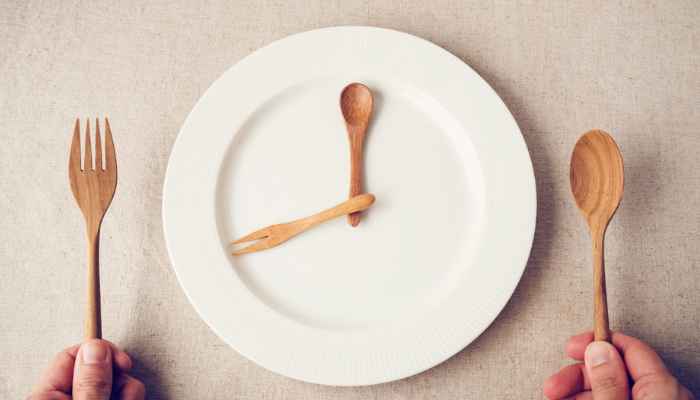Last Updated on June 3, 2024 by Nicole
If you’ve been trying to lose weight then you’ve probably heard of intermittent fasting. Not surprisingly, it is currently one of the most popular fitness trends for weight loss. However, did you know there are many benefits to a 14 hour fast? The reason behind this is that it’s simple to follow, doesn’t have any specific diet restrictions, and has been shown to yield impressive results for thousands of people with very little effort.
But what about those who need to take medication regularly such as individuals with thyroid disease? How would that work and does thyroid medication break intermittent fasting? How long should you fast for? Is it safe for those who need medication to even try intermittent fasting? Let’s get into it.
What is Intermittent Fasting?
Intermittent Fasting is the practice of only eating during specific time frames and fasting the rest of the time. One of the great appease of this weight loss method is the fact that you do not need to change your diet as there are no restrictions associated with it. Having said that, it is recommended that you eat a healthy nutritious diet to obtain better results as well as ensure that you are properly hydrated when fasting. Drinking plenty of water will also help to curb your appetite if you are experiencing hunger pangs during your fasting window.
There are quite a few different methods of intermittent fasting including:
- Time Restricted Fasting – This can mean fasting anywhere from 12-16 hours typically while you sleep. An example is the 14/10 method. This involves a 14-hour fast in which you only eat meals during the remaining 10. This can include 2 or 3 meals. The 14/10 method is also recommended over the 12/12 method as research has shown that it’s more effective for weight loss.
- The 5:2 Method – For this method, you just eat like you would on any other day for five days of the week, and on the two remaining days you then restrict your calorie intake down to 500 or 600 calories. You can group the two days one after the other, but this is not recommended. Instead, try to space your fasting days out with one or two non-fasting days between.
- Alternate Day Fasting – The idea behind this method is to fast every other day. This could mean that you avoid solid foods on your fasting days, or for some, you may limit your calorie intake similar to the 5:2 method.
- 24-Hour Fast – This method, also known as the eat-stop-eat method, means that you fast for an entire 24 hours either one or two days out of the week. You can still have things like water, tea, or other drinks with no calories in them. Even so, this method of fasting is not easy and is not recommended for everyone.
- The Warrior Diet – This method is considered to be one of the most extreme forms. It involves eating a minuscule amount of raw veggies or fruit during a fasting period of 20 hours and then consuming one large meal within the remaining 4-hour window in the evening.
How Long Should You Fast?
Because there is limited research on all the various methods of intermittent fasting there is much debate on whether or not there is a minimum fasting window to yield results. There are many factors to consider when trying to lose weight healthily and to be able to sustain it long-term. It’s also going to affect everyone differently due to things like your gut health, personal diet, and activity levels. Even the amount of sleep you get will impact the success of your intermittent fasting journey.
Having said that, research suggests that a fast that is less than 12 hours doesn’t do much of anything. A 12-hour fast is the bare minimum to receive any of the benefits of fasting such as weight loss, mental clarity, and improved blood sugar regulation. While you do receive some benefits from a 12-hour fast, it is not optimal for weight loss and will take much longer to yield results.
Why a 14 Hour Fast?
According to experts on intermittent fasting, the optimal amount of time to fast is between 14 and 18 hours. It provides greater weight loss yet isn’t too difficult for most to follow. It’s also the ideal range for the body to enter the state known as ketosis as long as specific conditions are met within your diet.
Even so, much of the appeal of intermittent fasting is that you do not need to change your diet to lose weight. Studies have shown that participants who followed a 14-hour fast experienced a 3% drop in weight as well as a 4% decrease in visceral fat around their abdominals. Typically, when you shorten the eating window, your calories are decreased as well. This results in weight loss as you are consuming fewer calories than the amount your body burns.
Can You Take Medication While Fasting?

In short, it depends greatly on what medication you are taking. To answer this question, you must understand how food can affect your medication as some foods can cause interactions or even change how your system absorbs them. These types of medications are typically taken without food.
Other medications need to be taken with a meal as they can have unpleasant side effects such as nausea, vomiting, acid reflux, heartburn, or cause damage to the stomach lining. These types of medications should typically be taken with a meal or right after one, but ultimately you should be following your doctor’s guidance regarding your medication.
If you are not sure as to whether you can try intermittent fasting due to the medications you are prescribed, talk to your doctor before moving forward. If you have already begun intermittent fasting and are feeling negative effects after you’ve taken your medication, stop and consult your doctor immediately.
Does Medication Break Intermittent Fasting?
Another question many have is whether medication can break your intermittent fasting or not. According to the guidelines for intermittent fasting, only things that have calories can break a fast. Seeing as most medications do not have calories, they alone cannot break a fast.
Keep in mind that not all medications are calorie-free. Even some supplements may contain calories. Things like syrups with sugar, pills with a sugar coating, and gummies all contain calories that will break your fast. Additionally, the sugars from these products can stimulate your appetite causing you to break your fast prematurely.
Conclusion
In summary, there are many different types of intermittent fasting but if your goal is to lose weight efficiently and sustainably a 14-hour fast is what we recommend. This means that you fast for 14 hours and only consume meals during the remaining 10-hour window. You do not need to change your diet, but it is recommended to eat a healthy nutritious diet for the best results.
Medications can be taken while intermittent fasting depending on specifically what those medications are. Some medications must be taken with food, and some should not. Many medications do not have calories in them and will not break your fast, but some of them do such as certain supplements containing sugar. These should not be taken during your fasting windows.
Is fasting for 14 hours good?
According to a study, this daily behavior encourages weight loss. According to a recent study, time-restricted eating helped overweight individuals who were at a high risk of developing Type 2 diabetes lower their belly fat by 3%, drop body weight, and feel more energized.
What can I eat during 14-hour fast?
These are some guidelines for adhering to the 14:10 diet: Be conscious of what you consume, concentrating on wholesome, nutrient-dense foods like fruits, vegetables, lean meats, beans, nuts, seeds, eggs, and low-fat dairy. You will feel fuller for longer if you eat foods high in fiber, good fats, and protein.
Are 14 hours of fasting as good as 16?
Most dietitians advise a type of intermittent fasting that fits into a person’s lifestyle, and a 14-hour fasting window is more manageable than a 16-hour fasting window, according to Julie Upton, MS, RD, and cofounder of Appetite for Health.

